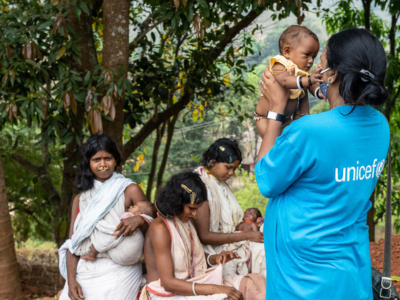UNICEF's humanitarian action for children focuses on interventions that save lives, alleviate suffering, maintain human dignity, and protect the rights of affected populations wherever there are humanitarian needs – from armed conflicts to natural disasters to public health emergencies.
This pathway introduces learners to UNICEF's humanitarian policy and framework, centering on the Core Commitments for Children (CCCs), Emergency Procedures, the Preparedness Procedures. It equips learners with the underpinning knowledge required to provide a principled and rights-based approach guided by international legal frameworks, global standards and humanitarian principles.
Learning objectives
By the end of this pathway, learners will be able to:
- Recognize UNICEF’s dual mandate, and role and accountabilities within the wider humanitarian system.
- Understand and recognize UNICEF's humanitarian policy (the CCCs) international humanitarian law, and global standards and humanitarian principles.
- Develop the capability to prepare for and rapidly apply UNICEF’s procedures in emergencies.
- Foster a deeper understanding and commitment to child rights and safeguarding, PSEA, and accountability to affected people.
Audience
UNICEF staff at all levels; Partners including NGOs, UN agencies, National Committees, and local stakeholders involved in or supporting humanitarian action.
Methodology
- Pathway activities combine self-paced e-learning modules with interactive content to enhance engagement and retention of knowledge.
- Learners can choose order of the pathway activities for a more personalized learning experience and progress at one's own pace to build knowledge and skills on various topics from policy foundations to specific operational guidelines.
- Incorporation of interactive videos, real-world scenarios and case studies to enhance practical understanding and application.
Structure
UNICEF Fundamentals of Humanitarian Action: Level 1: Includes 11 activities covering a range of topics from UNICEF’s humanitarian policies and procedures to child rights and safeguarding, with a total required time of approximately 14-16 hours.
Upon completion of this pathway, learners can advance to UNICEF Fundamentals of Humanitarian Action: Level 2 which covers UNICEF humanitarian action overarching commitments and cross-cutting themes such as advocacy, gender equality, and disability inclusion.
(* The year 2024 marks a soft launch of the pathway, with additional courses expected to be added progressively. We encourage learners to regularly check back for updates and new course offerings.)
Length
Total Duration: Approximately 14-16 hours to complete.
Contact details
For humanitarian learning channel queries, please contact Tatjana Klein, Learning and Development Specialist, Humanitarian Evidence and Learning Section, Office of Emergency Programmes, tklein@unicef.org or Karima Duval, Programme Specialist (Instructional Design), Humanitarian Evidence and Learning Section, Office of Emergency Programmes, kduval@unicef.org.
